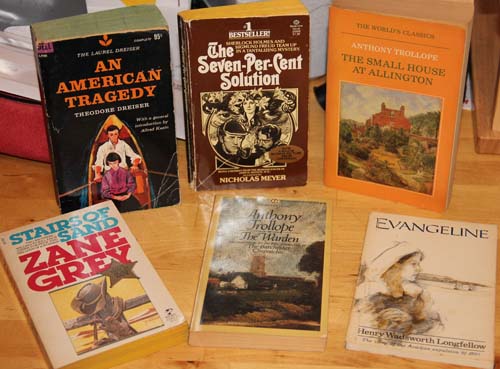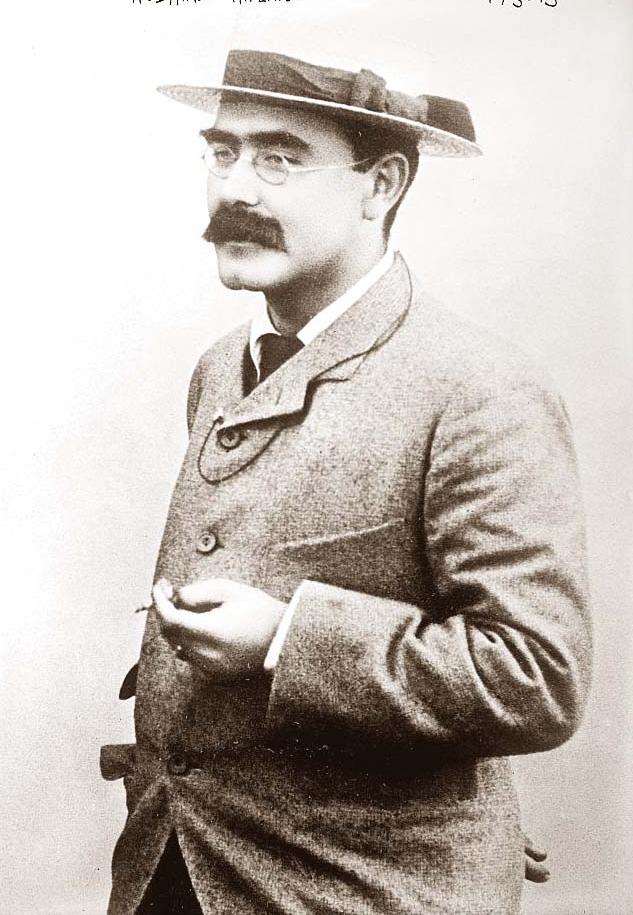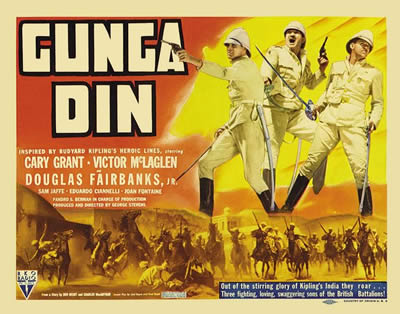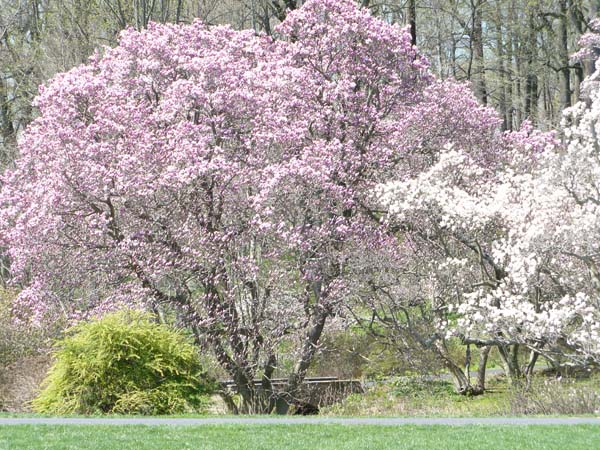3 Dollars Worth of Literature
May 22nd, 2011
Have I mentioned that I love Housing Works? They run a fantastic Bookstore Cafe on Crosby Street in SoHo that both collects and sells an amazing panoply of used books and records. I finally gave up trying to give away my recent reading material and decided to donate it to Housing Works. In fact, I think I bought most of it there in the first place.
Of course the best part about donating your books when you’re through with them is that it gives you a perfect excuse to scoop up a few new titles while you’re in the shop. Here’s my haul from today’s jaunt:

I always head straight for the 50 cent rack — they may have a little more wear on the spine, but they’re perfect for dragging around the City (I do much of my reading while I walk — yes, I’m that nut you banged into earlier with her nose buried in a copy of Dubliners — at least it’s better than running into people because you’re texting on your mobile phone). So this impressive array cost a mere $3 plus tax. My companion, he of the exquisitely eclectic taste, snagged a Frank Sinatra LP and a first edition of Oboler’s Omnibus. If you don’t know who Arch Oboler was, ask someone who was born before you were.
I actually hated Sister Carrie, and vowed never to read another book by Dreiser. But I know enough about the plot of American Tragedy to have had my curiosity piqued. I’ve never read anything by Zane Grey, but early 20th century westerns are a guilty pleasure in which I indulge too rarely. The Trollopes are because someone (I only wish I could remember who) told me I’d enjoy him more than Hardy. Evangeline needs no explanation; though perhaps I should tell you it holds particular meaning thanks to my fifth grade history project where I recreated an Acadian folk-costume. Last but not least, The Seven-Per-Cent Solution is a silly present for a friend.
Have you read any of these? Tell me what you thought — but please don’t spoil the endings!
Hours of Idleness
May 13th, 2011
A Fragment
When, to their airy hall, my father’s voice
Shall call my spirit, joyful in their choice;
When, poised upon the gale, my form shall ride,
Or, dark in mist, descend the mountains side;
Oh! may my shade behold no sculptured urns,
To mark the spot where earth to earth returns!
No lengthen’d scroll, no praise-encumber’d stone;
My epitaph shall be my name alone:
If that with honour fail to crown my clay,
Oh! may no other fame my deeds repay!
That, only that, shall single out the spot;
By that remember’d, or with that forgot.
One of my favorite verses, from Byron’s compendium of verse Hours of Idleness, published in 1807. Clearly Byron achieved his goal, but perhaps not in quite the way he anticipated. I am reminded of this passage from Washington Irving’s essay on Westminster Abbey:
And yet it almost provokes a smile at the vanity of human ambition, to see how they are crowded together and jostled in the dust; what parsimony is observed in doling out a scanty nook, a gloomy corner, a little portion of earth, to those, whom, when alive, kingdoms could not satisfy; and how many shapes, and forms, and artifices are devised to catch the casual notice of the passenger, and save from forgetfulness, for a few short years, a name which once aspired to occupy ages of the world’s thought and admiration.
I passed some time in Poet’s Corner, which occupies an end of one of the transepts or cross aisles of the abbey. The monuments are generally simple; for the lives of literary men afford no striking themes for the sculptor. Shakspeare and Addison have statues erected to their memories; but the greater part have busts, medallions, and sometimes mere inscriptions. Notwithstanding the simplicity of these memorials, I have always observed that the visitors to the abbey remained longest about them. A kinder and fonder feeling takes place of that cold curiosity or vague admiration with which they gaze on the splendid monuments of the great and the heroic. They linger about these as about the tombs of friends and companions; for indeed there is something of companionship between the author and the reader. Other men are known to posterity only through the medium of history, which is continually growing faint and obscure; but the intercourse between the author and his fellow-men is ever new, active, and immediate. He has lived for them more than for himself; he has sacrificed surrounding enjoyments, and shut himself up from the delights of social life, that he might the more intimately commune with distant minds and distant ages. Well may the world cherish his renown; for it has been purchased, not by deeds of violence and blood, but by the diligent dispensation of pleasure. Well may posterity be grateful to his memory; for he has left it an inheritance, not of empty names and sounding actions, but whole treasures of wisdom, bright gems of thought, and golden veins of language.
Where’s Rudyard?
May 9th, 2011
I have been conducting an informal survey lately, to see how many of my acquaintance are familiar with the works of Rudyard Kipling, most particularly his “Stalky” stories. So far, the results have not been very encouraging for the Pukka Sahib. Most know who he was, but few have read any of his works — poetry or prose — and none have even heard of Stalky & Co.

So I have decided that the world is in great need of more Rudyard Kipling. If you’re young, or possess a fanciful bent, I recommend Kipling’s Just So Stories. If you haven’t much time to read these days, try grazing your way through the short stories in Plain Tales from the Hills. But for real, pure enjoyment, find a copy of Stalky & Co.
Of course, reading Kipling requires more than a little tolerance. One might characterize him as a misogynistic, xenophobic imperialist. I find his humor makes up for his politics, and his talent for storytelling takes care of the rest. After all, we are talking about the fin de siècle British army…I particularly appreciate my recent re-readings of Kipling since my foray into T.E. Lawrence (aka Lawrence of Arabia), who wrote in Seven Pillars of Wisdom, “Some of the speed and secrecy of our victory…might perhaps be ascribed to…the rare feature that from end to end of it there was nothing female in the Arab movement, but the camels.” Of course Kipling writes about India, not Arabia, but the attitudes are quite similar.

Even if you don’t heed my plea to find a copy of something by Kipling, you can at least read his most famous poem (immortalized in 1939 by a film starring Cary Grant, Douglas Fairbanks Jr., and Sam Jaffe in the title role):
GUNGA DIN
YOU may talk o’ gin an’ beer
When you’re quartered safe out ‘ere,
An’ you’re sent to penny-fights an’ Aldershot it;
But if it comes to slaughter
You will do your work on water,
An’ you’ll lick the bloomin’ boots of ‘im that’s got it.
Now in Injia’s sunny clime,
Where I used to spend my time
A-servin’ of ‘Er Majesty the Queen,
Of all them black-faced crew
The finest man I knew
Was our regimental bhisti, Gunga Din.It was “Din! Din! Din!
You limping lump o’ brick-dust, Gunga Din!
Hi! slippy hitherao!
Water, get it! Panee lao!
You squidgy-nosed old idol, Gunga Din!”The uniform ‘e wore
Was nothin’ much before,
An’ rather less than ‘arf o’ that be’ind,
For a twisty piece o’ rag
An’ a goatskin water-bag
Was all the field-equipment ‘e could find.
When the sweatin’ troop-train lay
In a sidin’ through the day,
Where the ‘eat would make your bloomin’ eyebrows crawl,
We shouted “Harry By!”
Till our throats were bricky-dry,
Then we wopped ‘im ’cause ‘e couldn’t serve us all.It was “Din! Din! Din!
You ‘eathen, where the mischief ‘ave you been?
You put some juldee in it,
Or I’ll marrow you this minute,
If you don’t fill up my helmet, Gunga Din!”‘E would dot an’ carry one
Till the longest day was done,
An’ ‘e didn’t seem to know the use o’ fear.
If we charged or broke or cut,
You could bet your bloomin’ nut,
‘E’d be waitin’ fifty paces right flank rear.
With ‘is mussick on ‘is back,
‘E would skip with our attack,
An’ watch us till the bugles made “Retire.”
An’ for all ‘is dirty ‘ide,
‘E was white, clear white, inside
When ‘e went to tend the wounded under fire!It was “Din! Din! Din!”
With the bullets kickin’ dust-spots on the green.
When the cartridges ran out,
You could ‘ear the front-files shout:
“Hi! ammunition-mules an’ Gunga Din!”I sha’n’t forgit the night
When I dropped be’ind the fight
With a bullet where my belt-plate should ‘a’ been.
I was chokin’ mad with thirst,
An’ the man that spied me first
Was our good old grinnin’, gruntin’ Gunga Din.‘E lifted up my ‘ead,
An’ ‘e plugged me where I bled,
An’ ‘e guv me ‘arf-a-pint o’ water—green;
It was crawlin’ an’ it stunk,
But of all the drinks I’ve drunk,
I’m gratefullest to one from Gunga Din.It was “Din! Din! Din!
‘Ere’s a beggar with a bullet through ‘is spleen;
‘E’s chawin’ up the ground an’ ‘e’s kickin’ all around:
For Gawd’s sake, git the water, Gunga Din!”‘E carried me away
To where a dooli lay,
An’ a bullet come an’ drilled the beggar clean.
‘E put me safe inside,
An’ just before ‘e died:
“I ‘ope you liked your drink,” sez Gunga Din.
So I’ll meet ‘im later on
In the place where ‘e is gone—
Where it’s always double drill and no canteen;
‘E’ll be squattin’ on the coals
Givin’ drink to pore damned souls,
An’ I’ll get a swig in Hell from Gunga Din!Din! Din! Din!
You Lazarushian-leather Gunga Din!
Tho’ I’ve belted you an’ flayed you,
By the livin’ Gawd that made you,
You’re a better man than I am, Gunga Din!— Rudyard Kipling
Last, but not least, my own best beloved just turned me on to this mind-blowing gem (please ignore the incongruous footage from Easy Rider):
Rural Musing
April 29th, 2011
Suddenly, everywhere I look, the world is ripe and heavy with full-blown spring. I begin to hear the siren song of rocks and fields and streams and woods. Yet here I stay, trapped in an asphalt jungle. Someday soon, I shall break out of my prison and run wildly to bury my face in the verdure of a handy meadow.

TO THE RURAL MUSE.
“Smile on my verse, and look the world to love.”
Muse of the Fields! oft have I said farewell
To thee, my boon companion, loved so long,
And hung thy sweet harp in the bushy dell,
For abler hands to wake an abler song.
Much did I fear my homage did thee wrong:Yet, loth to leave, as oft I turned again;
And to its wires mine idle hands would cling,
Torturing it into song. It may be vain;
Yet still I try, ere Fancy droops her wing,
And hopeless Silence comes to numb its ev’ry string.Muse of the Pasture Brooks! on thy calm sea
Of poesy I’ve sailed; and though the will
To speed were greater than my prowess be,
I’ve ventur’d with much fear of usage ill,
Yet more of joy. Though timid be my skill,As not to dare the depths of mightier streams;
Yet rocks abide in shallow ways, and I
Have much of fear to mingle with my dreams.
Yet, lovely Muse, I still believe thee by,
And think I see thee smile, and so forget I sigh.Muse of the Cottage Hearth ! oft did I tell
My hopes to thee, nor feared to plead in vain;
But felt around my heart thy witching spell,
That bade me as thy worshipper remain:
I did so, and still worship. Oh! again.Smile on my offerings, and so keep them green;
Bedeck my fancies like the clouds of even,
Mingling all hues which thou from heaven dost glean!
To me a portion of thy power be given,
If theme so mean as mine may merit aught of heaven.For thee in youth I culled the simple flower,
That on thy bosom gained a sweeter hue,
And took thy hand along life’s sunny hour,
Meeting the sweetest joys that ever grew;
More friends were needless, and my foes were few.Though freedom then be deemed as rudeness now,
And what once won thy praise now meet disdain,
Yet the last wreath I braided for thy brow,
Thy smiles did so commend, it made me vain
To weave another one, and hope for praise again.With thee the spirit of departed years
Wakes that sweet voice which time hath rendered dumb;
And freshens, like to spring, loves, hopes, and fears,
That in my bosom found an early home,
Wooing the heart to ecstasy.I come to thee, when sick of care, of joy bereft,
Seeking the pleasures that are found in bloom.
O happy hopes, that Time hath only left
Around the haunts where thou didst erst sojourn!
Then smile, sweet Muse, again, and welcome my return.— John Clare, 1835
Sherlock Revisted
April 13th, 2011
It’s been more than a decade since my last serious foray into the adventures of Sir Arthur Conan Doyle’s famed detective. In my far-distant (at least it feels that way) youth, I was quite the enthusiast for anything and everything related to Sherlock Holmes. I read and re-read the stories, even attempting to employ Holmes’s methods, though I was usually stymied by the homogenizing effects of modernity.
I secretly enjoy listening to reruns of the Sherlock Holmes radio programmes (particularly the American version sponsored by Clipper Craft Clothiers or Roma Wines). But I could never quite bring myself to watch the movies or TV shoes. The old ones portray Watson as so elderly, pompous, and unattractive. The latest attempt was much too stylized for my taste — at least based on the posters that were plastered across the City when it came out. If they’d cast Adrien Brody as Holmes, I might have been tempted. Not that I am such a fan (I rarely like living actors), but he really would have been perfect.
My great love will always be Doyle’s stories, with the original Paget illustrations. What a world they created! If newspapers today published such things, I might consider subscribing. Are you listening, New York Times?

I just downloaded the collected Sherlock Holmes stories to my digital book. They’re all available for free from Google Books. What, you may be asking, has reawakened my ardor for the great detective? A friend and comrade in the New York Nineteenth Century Society is planning a weekend Bartitsu (the lost martial art practiced by Holmes) seminar in late July. I’ve signed on to help organize an evening lecture and reception at The Waystation in Brooklyn. You can read more about Bartitsu on my friend’s web site.
And of course, I will post details soon about how you can register to learn Bartitsu (or purchase a raffle ticket to win a free seat at the seminar) as well as information about the evening event — which will include a lecture, film screenings, and a costume contest!
« Newer Posts — Older Posts »